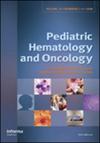小儿髓母细胞瘤和原始神经外胚层肿瘤幸存者的表观遗传学年龄加速。
IF 1.2
4区 医学
Q4 HEMATOLOGY
Pediatric Hematology and Oncology
Pub Date : 2023-05-01
Epub Date: 2022-07-21
DOI:10.1080/08880018.2022.2101722
引用次数: 0
摘要
儿童中枢神经系统(CNS)肿瘤幸存者会出现与衰老相关的早发表型。DNA甲基化(DNAm)年龄是生理年龄的一种新兴表观遗传生物标志物,可预测长期幸存者的慢性健康状况。本报告利用 83 名小儿中枢神经系统肿瘤幸存者确诊后的血液样本(中位数:确诊后 3.9 年;范围:0.04-15.96)描述了表观遗传年龄加速的过程。72%的患者被检测出表观遗传年龄加速,其年代学年龄与 DNAm 年龄的平均差异为 2.58 岁(95% CI:1.75-3.41,p<0.05)。本文章由计算机程序翻译,如有差异,请以英文原文为准。
Epigenetic age acceleration among survivors of pediatric medulloblastoma and primitive neuroectodermal tumor.
Survivors of childhood central nervous system (CNS) tumors experience early-onset aging-related phenotypes. DNA methylation (DNAm) age is an emerging epigenetic biomarker of physiologic age and may be predictive of chronic health conditions in long-term survivors. This report describes the course of epigenetic age acceleration using post-diagnosis blood samples (median: 3.9 years post-diagnosis; range: 0.04-15.96) from 83 survivors of pediatric CNS tumors. Epigenetic age acceleration was detected in 72% of patients, with an average difference between chronologic and DNAm age of 2.58 years (95% CI: 1.75-3.41, p < 0.001). Time from diagnosis to sample collection correlated with the magnitude of epigenetic age acceleration.
求助全文
通过发布文献求助,成功后即可免费获取论文全文。
去求助
来源期刊
CiteScore
2.60
自引率
5.90%
发文量
71
审稿时长
6-12 weeks
期刊介绍:
PHO: Pediatric Hematology and Oncology covers all aspects of research and patient management within the area of blood disorders and malignant diseases of childhood. Our goal is to make PHO: Pediatric Hematology and Oncology the premier journal for the international community of clinicians and scientists who together aim to define optimal therapeutic strategies for children and young adults with cancer and blood disorders. The journal supports articles that address research in diverse clinical settings, exceptional case studies/series that add novel insights into pathogenesis and/or clinical care, and reviews highlighting discoveries and challenges emerging from consortia and conferences. Clinical studies as well as basic and translational research reports regarding cancer pathogenesis, genetics, molecular diagnostics, pharmacology, stem cells, molecular targeting, cellular and immune therapies and transplantation are of interest. Papers with a focus on supportive care, late effects and on related ethical, legal, psychological, social, cultural, or historical aspects of these fields are also appreciated. Reviews on important developments in the field are welcome. Articles from scientists and clinicians across the international community of Pediatric Hematology and Oncology are considered for publication. The journal is not dependent on or connected with any organization or society. All submissions undergo rigorous peer review prior to publication. Our Editorial Board includes experts in Pediatric Hematology and Oncology representing a wide range of academic and geographic diversity.

 求助内容:
求助内容: 应助结果提醒方式:
应助结果提醒方式:


